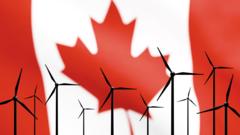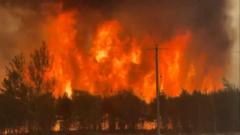With the upcoming federal election on April 28, Canadian candidates are shifting their environmental strategies, prioritizing fossil fuels over climate policy as they face issues surrounding rising costs and foreign relations.
Canadian Leaders Shift Focus from Climate to Fossil Fuels as Election Approaches

Canadian Leaders Shift Focus from Climate to Fossil Fuels as Election Approaches
As the Canadian federal election unfolds, climate concerns take a backseat to fossil fuel proposals amid rising costs and international tensions.
During the election season, pressing results have revealed drastic changes in policy stances from previous years.
Amid growing concerns over cost of living, Canada’s political arena is witnessing a noticeable pivot away from climate action as candidates focus on fossil fuel expansion. The two main rivals, Mark Carney of the Liberals and Pierre Poilievre of the Conservatives, are emphasizing the necessity of boosting energy production while sidelining their green agendas.
Historically, climate change was a paramount issue. The prior election saw values aligned with environmental objectives, highlighted by a net-zero emissions commitment set last year. Presently, however, Carney promoted a vision of making Canada a leader in both traditional and renewable energy, yet his first notable action as Prime Minister was to repeal the consumer carbon tax—a critical measure intended to deter carbon emissions.
Critics argue this decision represents a retreat from climate accountability, suggesting it signals an acceptance of the notion that climate action is economically burdensome. Meanwhile, Poilievre, backed by a strong base in resource-rich regions, advocates for significant growth in the oil and gas sectors, often critiquing the idea of climate policies impeding economic stability.
Environmental experts remark on the unusual dynamics shaping this election. Factors previously unseen—like international demands for Canadian resources in light of geopolitical shifts—are influencing voter priorities, even as devastating wildfires loom in memory. Moving into April, fossil fuel strategies appear more palatable amid public anxieties regarding energy availability and economic security.
Both candidates are now catering to these evolving concerns, aiming to establish new energy corridors and push forward fossil fuel initiatives, which stand at odds with Canada's international climate commitments. As the political landscape shifts and voters head to the polls, environmental principles may ultimately clash with economic imperatives, leaving a challenging path ahead for whoever assumes leadership.
Amid growing concerns over cost of living, Canada’s political arena is witnessing a noticeable pivot away from climate action as candidates focus on fossil fuel expansion. The two main rivals, Mark Carney of the Liberals and Pierre Poilievre of the Conservatives, are emphasizing the necessity of boosting energy production while sidelining their green agendas.
Historically, climate change was a paramount issue. The prior election saw values aligned with environmental objectives, highlighted by a net-zero emissions commitment set last year. Presently, however, Carney promoted a vision of making Canada a leader in both traditional and renewable energy, yet his first notable action as Prime Minister was to repeal the consumer carbon tax—a critical measure intended to deter carbon emissions.
Critics argue this decision represents a retreat from climate accountability, suggesting it signals an acceptance of the notion that climate action is economically burdensome. Meanwhile, Poilievre, backed by a strong base in resource-rich regions, advocates for significant growth in the oil and gas sectors, often critiquing the idea of climate policies impeding economic stability.
Environmental experts remark on the unusual dynamics shaping this election. Factors previously unseen—like international demands for Canadian resources in light of geopolitical shifts—are influencing voter priorities, even as devastating wildfires loom in memory. Moving into April, fossil fuel strategies appear more palatable amid public anxieties regarding energy availability and economic security.
Both candidates are now catering to these evolving concerns, aiming to establish new energy corridors and push forward fossil fuel initiatives, which stand at odds with Canada's international climate commitments. As the political landscape shifts and voters head to the polls, environmental principles may ultimately clash with economic imperatives, leaving a challenging path ahead for whoever assumes leadership.





















